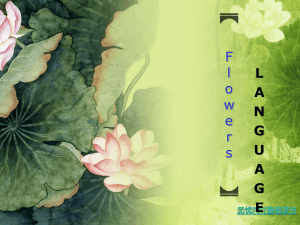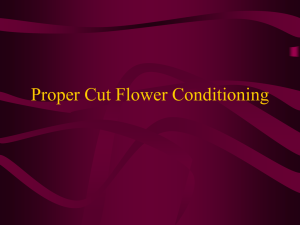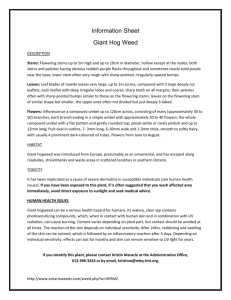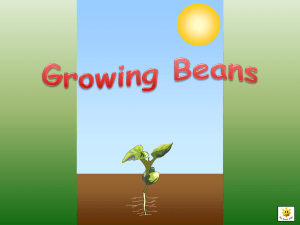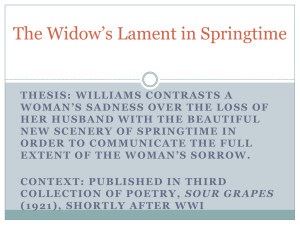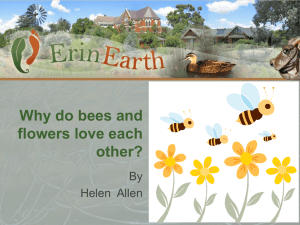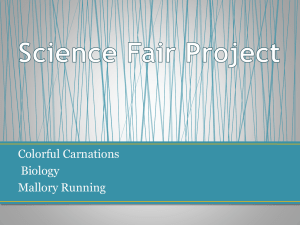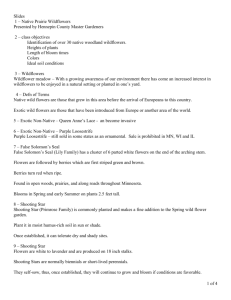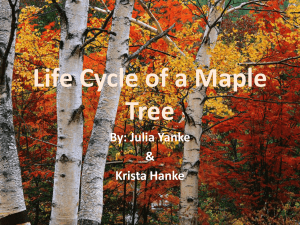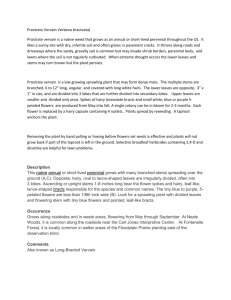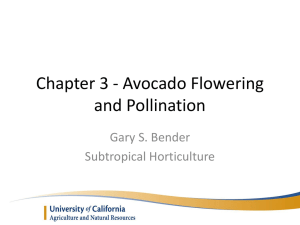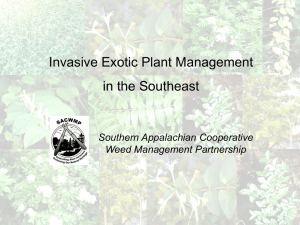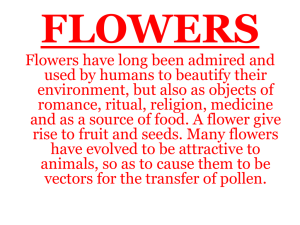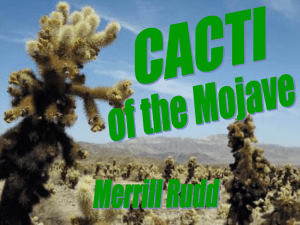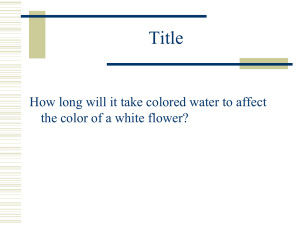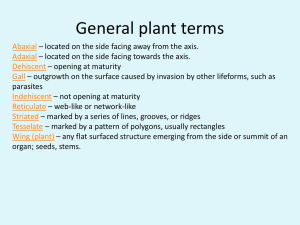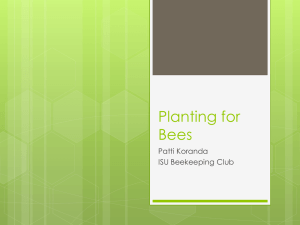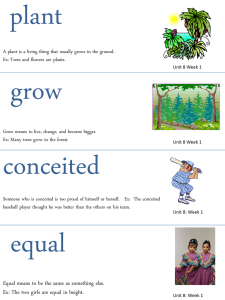Summer_Camp_Handouts_files/Pipestone Plant
advertisement
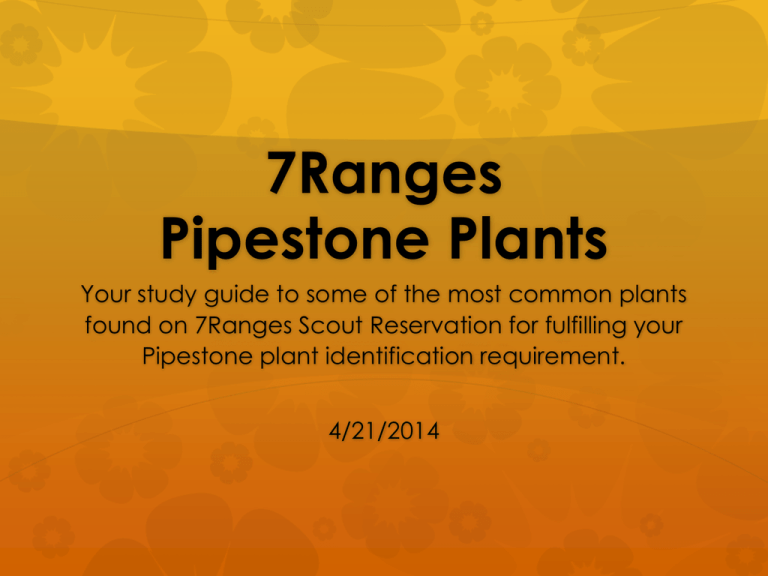
7Ranges Pipestone Plants Your study guide to some of the most common plants found on 7Ranges Scout Reservation for fulfilling your Pipestone plant identification requirement. 4/21/2014 st 1 Year Candidate Identify in the field: any combination of 15 trees, plants, or shrubs. nd 2 Year Candidate Identify in the field: any combination of 25 trees, plants, or shrubs. rd 3 Year Candidate Identify in the field: any combination of 35 trees, plants, or shrubs. th 4 & th 5 Year Candidate Serve as or assist the Unit Naturalist or Astronomer or serve in a designated leadership capacity. Nature walks The Eco department offers Nature walks on Monday and Tuesday afternoons at 2pm during summer camp for those who are interested in seeing the plants. If you attend both walks during the week, you will earn your ENVIRONMENTAL STRIP. Blue Spruce • Short needles • Bluish tint White Pine • Long needles in groups of 5 • Remember by spelling out the word WHITE Ohio Buckeye Tree • Official State tree of Ohio • 5 leaf stems • Pod with a buckeye inside Slippery Elm • Multiple leaves off of one stem • Jagged edges • Feels fuzzy to the touch Yellow Poplar “Tulip Tree” • Tulip shaped leaves • Large white flowers Shagbark Hickory • Shaggy bark • Multiple leaves off of one stem Sugar Maple • Sap is collected for maple syrup • Dark green leaves with medium green undersides • U-shaped between lobes • Winged seeds Red Maple • V-shaped between lobes • 3 large lobes, 2 small • Winged seeds • Can be tapped for syrup but not very productive Red Oak • Leaves are pointed • “Red Man’s Arrows” White Oak • Leaves are rounded • “White Man’s Bullets” Willow • Large droopy leaves • Long thin leaves off of one stem Sassafras • Leaves look like gloves or mittens – thumb on left or right, 3 fingers or one finger • Leaves smell like Root Beer • Can use in drinks Bird’s Foot Trefoil • Low to the ground and in clumps • Small yellow clover like flowers in groups of 2-6 Bramble • Bushes with thorns and blackberries • Can be found along the path leading up to Magic Mountain • Berries are edible and are ripe when dark black Bull Thistle • Flowers in clusters at end of branches • Have bumpy surface and end in long sharp spine • Stems 2-5’ tall Canadian Thistle • Often found in thick patches • Leaves alternate and divide into spiny-tipped lobes • Small and spineless heads • Stems 1-4’ tall Carpet Weed • Small soft leaves that grow in bar spots in the dirt where there is no grass • Likes the hot sun Cattails • Tall stems with a long brown puffy tail on top • Long green leaves • Found in wet areas near eco or along the drainage ditch or down by the pond Chicory • Large sky blue/purple daisy-like flowers • Find it mostly beside roads and highways • Open in the mornings and close as the sun gets hotter • Each flower is only open for one day Christmas Fern • Narrow leaves coming off of one stem • Found on hillsides Sensitive Fern • Likes shady moist areas • Sensitive to frost and dies back when touched by it • Lacks a true stem and is supported by a rigid leaf stalk Clover WHITE • Grows in large fields in large clumps • Has small white flower • Leaves are round with white stripe RED • Grows in fields • Has pink flowers Coltsfoot • Yellow flowers – same color shape and size as a dandelion flower • Stems are wooly and covered with bracts • Broad heart-shaped leaves – “looks like a Colt’s foot” Crabgrass • Grows in low lying fields and in bare spots in lawns • Looks like crab claws extending from the center Crown Vetch • Bright pink flowers found along highways and on hillsides to control erosion • Ground cover • Invasive Dandelion • Grows in low fields and in lawns • Yellow flowers that turn into round sphere looking seed pods Dogbane • A woody stem that exudes a milky sap • Two different species – hemp & spreading • Pinkish white or greenish white flowers Feather Grass • Tall grassy plant with a feathery tail at the top • Looks like feathers Fleabane • Tiny daisy like flowers with a yellow center • A wildflower that can be seen along roadways and in fields • Blooms all summer long Garlic Mustard • Tall stalks with triangular shaped leaves • One of Ohio’s worst invasive weeds • Leaves smell like garlic when crushed Goldenrod • Found in fields • Dense stalks with clumps of yellow flowers • Pollen too heavy to be blown by the wind Jack in the Pulpit • May be green or striped • Bright red berries in late summer Jewel Weed ”Touch Me Not” • Orange-red flowers • Seed pods that pop/explode when touched • An antidote for poison ivy Joe-Pye Weed • Clusters of tiny pink flowers on long stems • Smells like vanilla when crushed May Apple • Large leaf grows in an umbrella shape low to the ground • May have small white flower Multiflora Rose • Bushes that look like mini rose bushes with thorns and tiny rose like flowers. • Invasive and intertwines with other plants • Subject of service at 7Ranges and may be pulled • Everywhere at 7R Oxeye Daisy • White flowers with an orange yellow center • Typical daisy looking on a tall stalk with low dark green leaves Panic Grass • Tall grass with sharp sides • Can cut up your legs • Grows in clumps or fields Poison Ivy • Groupings of 3 leaves that are shiny • On a red vine • Can find growing up trees or on the ground Queen Ann’s Lace “Wild Carrot” • The flower looks like lace • The leaves look like carrot leaves and the root smells like carrot • Each flower cluster is made up of a bunch of tiny flowers Wood Sorrow “Sour-Grass” • Has heart shaped leaves in groups of three • Small yellow flowers • Leaves have a lemon taste • Often confused as clover Staghorn Sumac • Red hairy flowers at the tips of the branches • Hairy branches resembling deer antlers • May be a shrub or a tree Trillium • Ohio State wild flower • Three leaves and three pedals Virginia Creeper • Can look like poison ivy when it has only 3 leaves • When full grown, it has 5 leaves • Grows on a vine Yarrow • Fern like leaves • Small white flowers in clusters • Crushed leaves rubbed on your skin will give a numbing sensation Study Aids These are just some of the plants you will find at Summer Camp. There are hundreds of them. Study the binders that will be at camp, this slide show or make yourself flash cards. All these will help in studying for your plants ahead of time. Do not wait till the last minute at camp to get with your Naturalist. When doing you nature walks with your Naturalist, make sure you have studied and give yourself plenty of time. It may take a couple of walks to get them all done. The End Presentation created by Matthew Donze 4/21/2014
